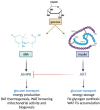The ABA/LANCL Hormone/Receptor System in the Control of Glycemia, of Cardiomyocyte Energy Metabolism, and in Neuroprotection: A New Ally in the Treatment of Diabetes Mellitus?
- PMID: 36674711
- PMCID: PMC9863406
- DOI: 10.3390/ijms24021199
The ABA/LANCL Hormone/Receptor System in the Control of Glycemia, of Cardiomyocyte Energy Metabolism, and in Neuroprotection: A New Ally in the Treatment of Diabetes Mellitus?
Abstract
Abscisic acid (ABA), long known as a plant stress hormone, is present and functionally active in organisms other than those pertaining to the land plant kingdom, including cyanobacteria, fungi, algae, protozoan parasites, lower Metazoa, and mammals. The ancient, cross-kingdom role of this stress hormone allows ABA and its signaling pathway to control cell responses to environmental stimuli in diverse organisms such as marine sponges, higher plants, and humans. Recent advances in our knowledge about the physiological role of ABA and of its mammalian receptors in the control of energy metabolism and mitochondrial function in myocytes, adipocytes, and neuronal cells allow us to foresee therapeutic applications for ABA in the fields of pre-diabetes, diabetes, and cardio- and neuro-protection. Vegetal extracts titrated in their ABA content have shown both efficacy and tolerability in preliminary clinical studies. As the prevalence of glucose intolerance, diabetes, and cardiovascular and neurodegenerative diseases is steadily increasing in both industrialized and rapidly developing countries, new and cost-efficient therapeutics to combat these ailments are much needed to ensure disease-free aging for the current and future working generations.
Keywords: AMPK; LANCL1/2; NO; PGC-1α; Sirt1/3; cardioprotection; hypoxia; mitochondrial proton gradient; neurodegeneration; oxidative stress.
Conflict of interest statement
The authors declare no conflict of interest.
Figures



References
-
- Bruzzone S., Moreschi I., Usai C., Guida L., Damonte G., Salis A., Scarfì S., Millo E., De Flora A., Zocchi E. Abscisic acid is an endogenous cytokine in human granulocytes with cyclic ADP-ribose as second messenger. Proc. Natl. Acad. Sci. USA. 2007;104:5759–5764. doi: 10.1073/pnas.0609379104. - DOI - PMC - PubMed
-
- Bruzzone S., Basile G., Mannino E., Sturla L., Magnone M., Grozio A., Salis A., Fresia C., Vigliarolo T., Guida L., et al. Autocrine Abscisic Acid Mediates the UV-B-Induced Inflammatory Response in Human Granulocytes and Keratinocytes. J. Cell Physiol. 2012;227:2502–2510. doi: 10.1002/jcp.22987. - DOI - PubMed
Publication types
MeSH terms
Substances
LinkOut - more resources
Full Text Sources
Medical
Research Materials

